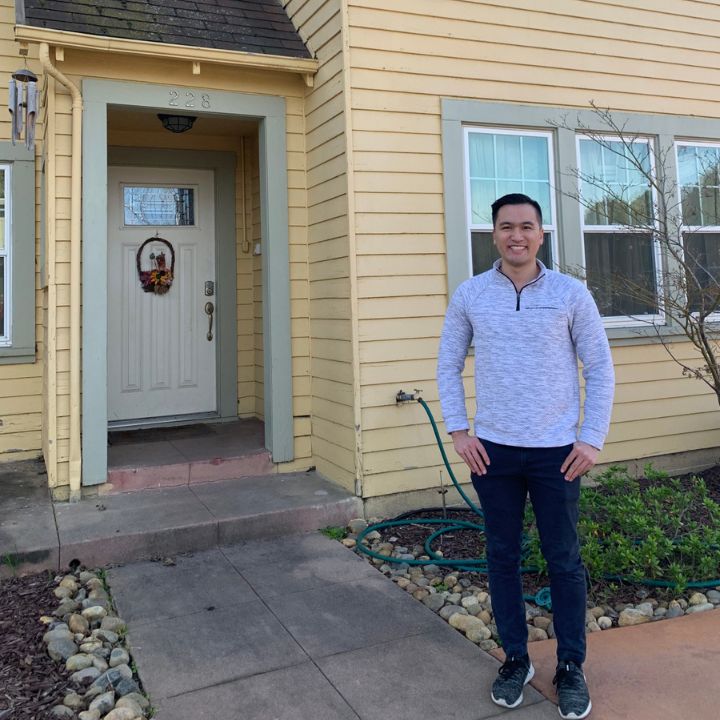Are rental properties a good investment? That’s what we’re going to cover in this article.
Let’s get started.
What are rental properties?
Rental properties are properties you can buy as investments and then rent out to people on a long-term or short-term basis.
There are all kinds of different properties you could invest in. More specifically, they include:
- Commercial: Property that’s used for business purposes (offices, retail stores, restaurants, and hotels).
- Residential: Property that is used for housing (single-family homes, apartments, townhouses, and so on). These can also be short-term travel rentals.
- Industrial: Property that is used for manufacturing, storage, or distribution purposes (warehouses, distribution centers, and factories).
No matter what the property type is, though, the goal tends to be the same: To create cash flow without having to exchange your time for money. (And we’ll talk more about that in a minute.)
Are rental properties actually profitable?
Rental properties can be highly profitable. With that said, how profitable your investments would be depends on several factors, like what kind of property you invest in, location, condition, and the state of the market.
You need to factor in costs, too. These include mortgage payments, property taxes, insurance, maintenance, and repairs.
According to the National Association of Realtors, the average rent in the US is $2,508 and 35% of households live in rental properties. However, the average rent is 12.95% lower than average monthly mortgage payments – so you need to be careful about the type of rental property you invest in.
Ultimately, the profitability of your property comes down to calculating your expenses and projected cash flow (the amount you earn after all expenses have been paid) before investing in a property to double check that you wouldn’t be losing money every month.
To give you a concrete example, take a look at a couple of my real estate investing students.
Kali acquired a property with $4,200 in monthly cash flow.
While Chetan’s first property has a $2,300 monthly cash flow.
Here’s me with one of my own first rental properties. Since then, I’ve successfully quit my day job and built a growin greal estate investing business.

Okay, let’s talk more about whether you should or shouldn’t invest in rental properties…
Are rental properties worth it?
To figure out if a rental property would be a good investment or not, figure out how much cash flow you could expect to collect right away.
This is an incredibly important calculation.
Why?
Because when you’re buying properties as investments, you want to maximize your ROI so you can pay off your mortgage faster and potentially invest in other assets.
That way, you’ll be in a good position to start building wealth rather than losing money.
For example, to grow my own real estate portfolio, I reinvest my returns into new rental properties every year.
But if I didn’t have positive cash flow, I wouldn’t be able to do that. In fact, if I didn’t have positive cash flow, my debt would snowball rather than my income.
So, don’t skip this step. Make sure the property you’re interested in would be an asset and not a liability.
Is it a good time to invest in rental property?
Currently, interest rates are high.
And that means many people don’t want to buy right now because they’d be saddled with a higher-than-average mortgage payment.
But, the flip side to this situation is that you as a buyer have more negotiating power.
For example, I recently negotiated the sale price of a home by over 18%. And despite a high mortgage, I have a high cash flow on that property, which makes it a great investment.
Here’s more on how I did it:
Pros and cons of owning a rental property
Like with anything, there are pros and cons to having rental properties. Let’s talk about them.
What are the advantages of rental property?
Mostly passive income – Once your properties are occupied, rent payments will come in every month without almost any active work on your part.
Property appreciation – Real estate typically becomes more valuable over time. So, you could theoretically sell at a profit down the road, if you decided to liquidate your assets. For example, the first property I bought increased in value by over $175,000 in seven years!
Tax benefits – As a landlord, you can take advantage of various tax breaks to reduce your property taxes. Ultimately, this can help you pay off your mortgage faster and keep more money in your pocket.
Diversified investment portfolio – Real estate helps you diversify your portfolio and make it easier to bounce back from any market fluctuations.
Impact – No matter what real estate niche you choose, you can make a difference just by offering quality rentals. For example, renting to hardworking students (like I do) means you’re helping people pursue their professional dreams by giving them an affordable housing option near campus. And as a landlord, knowing the impact you can have makes your investments even more meaningful.
Okay, now let’s take a look at some downsides to this type of investment.
What are the disadvantages of rental property?
Problem tenants – Having rentals means there’s always the risk of renting to people who are loud, messy, needy, and generally, cause a lot of trouble for you. But the good thing is that there are ways to find reliable, low maintenance tenants (and I’ll talk about that in a bit).
Market fluctuations – Real estate value can change quickly, and this can mean you end up with a property that’s worth less than what you paid for it. This is mostly a problem if you need to sell your property and end up doing so for less than the price you paid for it.
Reselling your property can be a challenge – In some situations, finding a buyer if you decide to sell can take a while – however, if you use a sustainable approach, you won’t need to sell your property on a whim.
Financial risks – When you invest in an expensive asset like a house, you run the risk of facing unforeseen expenses that could put a serious dent in your cash flow. One way to protect against this? Have a budget in place for property maintenance, like replacing old pipes, appliance upgrades, and so on. That way, you won’t get caught off-guard when expenses come up.
How do you invest in rental properties?
So, you’ve decided that you want to invest in rental properties. Here are a few steps to take to get started.
Decide on the type of property you want to invest in
Within real estate investing, there are all kinds of properties you could rent out. You could invest in, say, commercial property and rent out office or shop space. Or, you can invest in multifamily property, which tends to require more funds and possible outside investment.
Another option is single-family property, which tends to be the best niche for beginners.
So, how do you choose the right one for you? Be sure to choose a real estate niche that brings in cash flow, is achievable for you right now, and is sustainable.
For example, what I do is buy large square foot houses in college towns and convert as many rooms as possible into bedrooms.
By doing that, I create the kind of rentals that my target audience is looking for – and maximize my returns in the process.
That’s because renting individual rooms to college students means I can charge $500-$700+ per bedroom. So, by using the rent-by-the-room model, I end up earning significantly more than I would if I rented the whole property to one person or family.
Do market research
Before you buy a property, it’s a good idea to know what the local market looks like so you can fill a hole in the market.
First, figure out who your target market is. Take the time to really understand historical pricing trends, vacancy, and rents, as well as development plans, demographics, and so on.
Here’s an example: Let’s say you want to invest in a college town and rent to students specifically.
In that case, do some research about the town or area you’re interested in and figure out what you’re up against. You should find answers to relevant questions, like:
- What housing options do students currently have in the area?
- Is the local public transportation good?
- What does the local university charge for room and board?
- Is the area known for being a party town, or does it attract serious students?
Bottom line here: Study the market, and see what challenge your target audience has that you as an investor can solve.
So, again, if you want to target students specifically, put yourself in their shoes.
Is there a housing crisis in the area that makes it difficult for them to find affordable accommodation? Do they need to live near campus because they typically don’t have cars? Are they looking for fully furnished rentals because they don’t have furniture?
Basically, what are their biggest pain points?
Find out. And then focus on filling those needs. That’s how you’ll be successful.
Find the right property
Whether investing in rental property is a good choice or not has a lot to do with the property you decide to buy.
Here’s an example of what I mean by that:
Early on, when I was still a newbie investor, I made a huge mistake: I was so eager to get started that I bought an old house way too quickly – without getting it checked out first.
The result?
I had to deal with all kinds of problems, including animal infestations and broken pipes.
As you can imagine, that experience didn’t exactly go as planned.
But I learned a big lesson: Always do your homework and get an inspection done BEFORE purchasing a property. That way, even if you uncover problems, you’ll know what you’re getting yourself into.
And if you don’t mind slight renovations, you’ll be in a great position to negotiate with the property owner and get the best deal possible.
Another thing to do before buying a particular property? Find out what the zoning laws and rental regulations are in the area.
For example, you might have to abide by specific rules about how much you can charge your tenants in rent. So, do some research to make sure you won’t have legal issues down the road.
And speaking of tenants, let’s talk about how to attract the best.

Find the right tenants
No matter who you decide to rent to, you probably wouldn’t mind having tenants who pay their rent every month and don’t cause problems.
Okay, but how do you find them?
There are several steps you can take, and here’s the first one:
Pinpoint who your dream tenant is, and market directly to them.
In other words, ask yourself what things your target tenant is looking for in a home, and then provide that.
For example, let’s say you want to attract traveling healthcare workers. In that case, your target audience is probably looking for a place to live that has the following perks:
- Close to the healthcare facility where they work
- Off-street parking
- Fully furnished
- Quiet
For healthcare workers, amenities like off-street parking are a huge plus, especially if they work a late-night shift and need a secure place to keep their car.
This is why the first step to getting quality tenants is to understand who you’re trying to appeal to.
And once you’ve identified who you’re trying to attract, the next step is to advertise effectively.
How can you do that?
By going where your target audience goes to find housing.
So, depending on your target market, this may vary, but a few great options are location-specific housing Facebook groups, Craigslist, Roomies.com, Zillow, and ULoop.
(I have a complete article about marketing specifically to college students that you can check out right here.)
Manage your property
As an investor, you can choose whether you want to manage your rentals yourself or hire a property management service to take care of it for you.
And here’s the good news: Even if you choose to manage your investments yourself, it doesn’t have to take a lot of time. What I do is manage my properties using what I call “tenant empowerment.”
Basically, this means I let my tenants resolve common issues that come up without interfering myself.
This is helpful for a few reasons:
For one thing, problems tend to get resolved faster because there’s no middleman – if the internet is down, for example, they’ll call the carrier directly instead of contacting me first.
And two, it simplifies my life because I don’t have to be constantly available to my tenants.
Thanks to tenant empowerment, I’m able to drastically reduce the amount of time I spend working through problems and let my tenants handle things themselves.
Ultimately, this hack can help everyone save time by finding solutions faster.
Next steps
So, are rental properties a good investment? Now you know! As you can see, there are a lot of factors that play a role in determining whether a rental property is worth it or not.
Need help?
As a multiple 6-figure real estate investor who started from scratch as a total newbie, I know what works and what doesn’t.
Want someone who’s been there, done that to guide you? You can reach me here.
Read more:
Student Housing vs Multifamily: Which One is Better?
The Most Effective Student Housing Marketing Strategies


